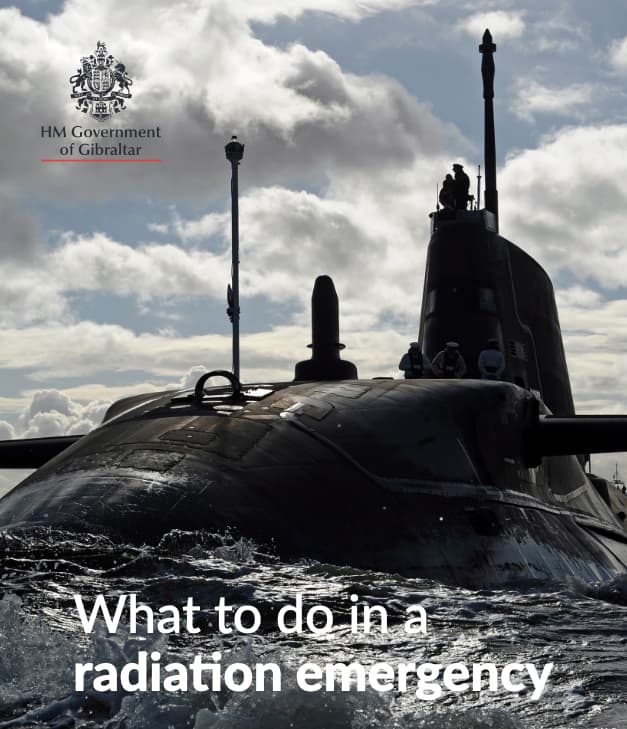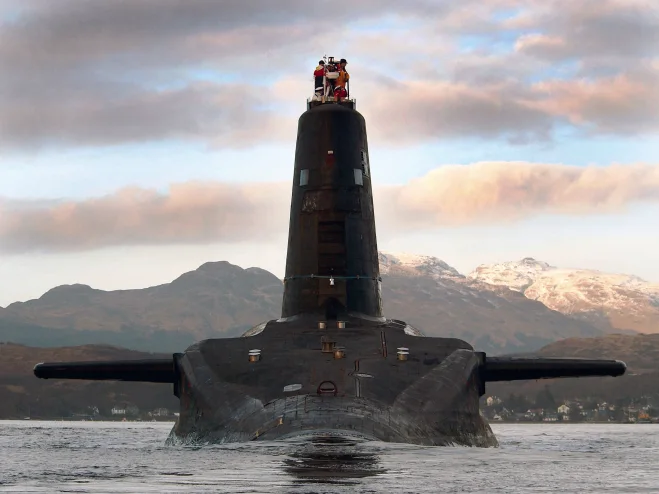9th November 2022
The Gibraltar Government and the Ministry of Defence have published detailed guidance on what to do in the event of a “radiation emergency”, part of a public information initiative ahead of the next nuclear preparedness exercise Rocky Pigeon, which will take place on Thursday.
The guidance, set out in a booklet, stresses a radiation incident is “extremely unlikely” and that the information is provided in line with UK practice for communities near bases.
The guidance was already in the public domain but had never been widely distributed as a stand-alone document.
Rocky Pigeon is a “demonstration exercise” between the MoD and the Government of Gibraltar to test their response in the event of a radiation accident in the Naval Base.
It is carried out every three years and is part of the accreditation process for the base’s Z Berth on the south mole, which is used to berth nuclear-powered submarines.
The exercise is monitored by two independent assessors, including one from the UK nuclear safety regulator – who will gauge the joint response.
The last exercise was conducted in 2019 and this year’s was programmed at that time and has been long in the planning, including a desktop dry run in September.
But it comes just days after a US Navy ballistic missile submarine docked in Gibraltar in a high-profile visit against the backdrop of escalating tension with Russia over the war in Ukraine.
Officials here stress the timing is coincidence and that this is just the latest edition of a triannual exercise that has been carried out for the past two decades.
As in previous years, Thursday’s exercise will include ‘real time’ scenarios which will take place on the MoD estate, in particular the Naval Base, with the Strategic Coordination Group based at No.6 Convent Place and the Tactical Coordination Group based in New Mole House.
Evacuation alarms may be sounded during the exercise and emergency service vehicles may be seen moving around the area.
Members of the public can be re-assured that this exercise is a necessary part of routine training and there is no need for them to take any action on hearing the alarms, the Gibraltar Government said.
The Minister for Civil Contingencies, Samantha Sacramento, said: “It is hugely important to continue with these exercises as this is an opportunity to learn if and how our plans can be improved.”
“Gibraltar can never be too prepared even in the extremely unlikely event of a radiation emergency.”
“I would also like to thank all the staff for all their planning ahead of this exercise and highlight the importance of the multiagency approach that is required for these types of exercises.”
The Minister for the Environment, Prof John Cortes, as Chair of the Radiation Response Committee, added: “Even though there is an extremely minimal chance of a radiation emergency in Gibraltar, it is vital that these exercises are done in order to prevent any negative health and environmental impacts in such an eventuality.”
Unusually this year, the Gibraltar Government and the MoD published a booklet with advice on what to do in the event of a radiation emergency at the Naval Base.
The information in the booklet was already public in the government major incident response plans but has never been circulated widely as a stand-alone booklet.
The booklet is a recommendation from assessors who monitored earlier exercises and is modelled on similar documents distributed to communities near other UK bases.
It sets out the risks in clear terms and explains the public would be alerted to any incident by the authorities via news channels, and via the naval base siren, a rising and falling wailing note.
“The design of nuclear-powered submarines and ships means the likelihood of a radiation incident is HIGHLY UNLIKELY,” the booklet states, highlighting key words in capitals.
“There is absolutely no risk of a ‘nuclear bomb’-type explosion.”
“If an incident happened, it probably wouldn’t affect people more than half a kilometre from the vessel, and because of the distance from the operational berth at the South Mole, this would PROBABLY only affect people within the naval base.”
According to the booklet, any radiation leak would almost certainly be contained within the submarine but that the main risk to the public would be if very tiny radioactive particles were released into the air.
These might be carried by the wind and could settle on people or objects that people were in contact with. These tiny particles are unstable and give off radiation.
The key bit of advice is to stay indoors, close windows and doors and tune in to local broadcasters and news organisations for updates on what steps to take.
Members of the Armed Forces would distribute iodine tablets – iodine minimises health risks from radiation – and schools would care for children until any risk subsides.
The booklet is available on the following link: http://environmental-agency.gi/wpcontent/uploads/2022/11/Radiation-Emergency-Advice.pdf

